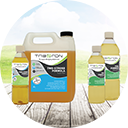Durability test confirms that Triboron reduces fuel without impacting the emissions system or particle filter
Pressrelease12 October, 2015
A recently completed engine lifecycle test preformed by the former Saab Automobile laboratories at NEVS (National Electric Vehicle Sweden) confirms Triboron’s ability to give a significant reduction of fuel consumption – without affecting the active surfaces in the catalytic converter or damaging the particle filter.
“This is excellent news for us. Since the petrol turbo engine already had covered over 184,000 km when we started, the test confirms that all cars, new and old, will benefit from using Triboron,” says Thomas Lindskog, Triboron International’s chief executive. “This verifies that a large-scale implementation would have a rapid and significant impact on a global reduction of CO2 emissions.“
The highly experienced team at NEVS performed a durability test, which is a 75,000 km rapid ageing test in a state-of-the-art AVL emission cell that corresponds to 100,000 km of real driving. It included both high-speed driving (130 km/h average) and lower speeds (55 km/h average).
Other extensive road tests in modern cars of various sizes and models, with and without Triboron added to the fuel, have produced even better results. Cars with Triboron in the fuel had an average reduction of fuel consumption with 3 to 5 percent compared to cars driven without Triboron.




